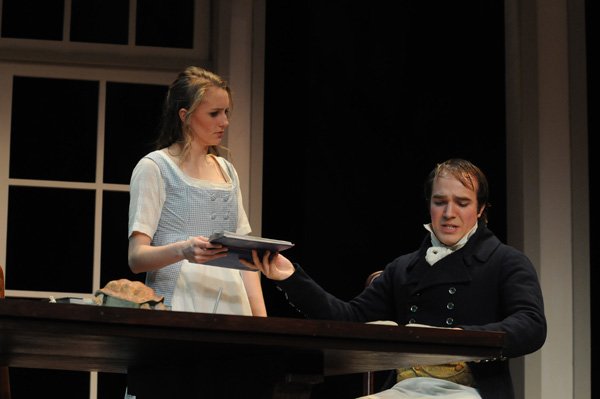FAYETTEVILLE — Hundreds, probably thousands, of words have been written about the deeper meanings of Tom Stoppard’s “Arcadia.”
“Art and science, man and nature, predictability and unpredictability, romanticism and classicism, intellect and passion: Stoppard lines up supposed opposites and shows how they collide and overlap.”
“‘Arcadia’ explores the nature of evidence and truth in the context of modern ideas about history, mathematics and physics.”
“The more abstract philosophical resonances veer off into epistemology, nihilism, the origins of lust and madness.”
“The themes within ‘Arcadia’ are based in a series of dichotomies. The most prominent of these is the idea of chaos versus order.”
Set all that aside, advises Mavourneen Dwyer, director of the production that opens this weekend at University Theatre in Fayetteville.
“It’s a comedy, believe it or not,” the University of Arkansas drama professor says. “If you don’t think you’re up on your biology, math, physics or whatever, just let that stuff roll off your back and enjoy the characters.
“They’re so funny and loving,” she adds. “And quite real. The characters and situations all feel very real.”
At the center of Stoppard’s script is a family, the Coverlys. Playgoers meet them - Thomasina, the daughter of the family, who ages from 13 to 16 over the course of the play; her tutor Septimus; her mother, Lady Croom; an unsuccessful poet and his libidinous wife;
and Thomasina’s youngerbrother Augustus - in 1809.
Audiences then return to the same English country estate in 1993 to get acquainted with Chloe, the 18-year-old daughter of the modernday Lady Croom; an author;
an unsuccessful academic;
Valentine, Chloe’s older brother; and Gus, her younger brother.
The comedy, says Dwyer, is found in the way the characters interact. There’s also a foreshadowing of tragedy - the untimely death of a character - and some mystery as “people from 1993 try to find out what happened in 1809,” she says.
Dwyer has cast each era separately. The room - used for Thomasina’s studies in 1809 and as a study for the family in 1993 - is the common element. By the end of the play, the table, a dominant feature on the set, is littered with items from both time periods. It’s an example of the chaos/ order theme of the play, says Stoppard scholar Paul Edwards.
“The main thing,” Dwyer reiterates, “is the lovable characters and who’s going to end up with whom. There’s plenty to read in the program about all the rest of it.”
A revival of “Arcadia” also opens tonight in New York.
***
FAQ
‘ARCADIA’
WHEN - 8 p.m. today- Saturday; 2 p.m. Sunday; and again March 2-6
WHERE - University Theatre in the Fine Arts Building on the University of Arkansas campus in Fayetteville
COST - $7-$16
INFO - 575-4752 or 575-3946
Whats Up, Pages 16 on 02/25/2011

